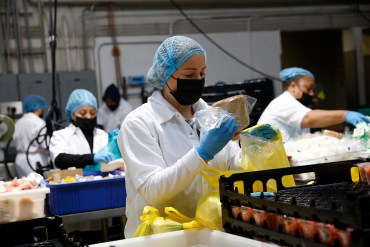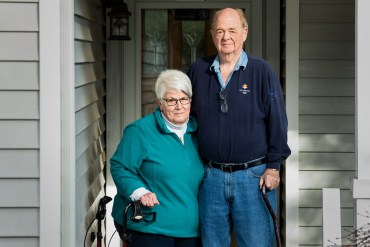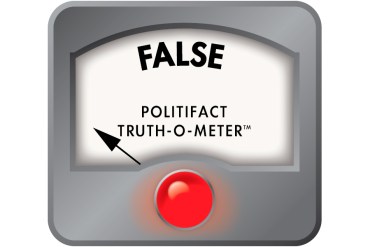Pandemic Delays Federal Probe Into Medicare Advantage Health Plans
Government officials want to focus on fighting COVID-19 instead of recouping overcharges that run into the millions.
To Curb Coronavirus, What’s Behind The Wearing Of A Mask?
The CDC recommends that Americans wear facial masks when they go to public places, such as the grocery store. But this is only one part of a multipronged effort to stop the virus’s spread.
Pacientes de cáncer enfrentan retrasos en cirugías mientras COVID-19 paraliza hospitales
Son más vulnerables a la infección por el nuevo coronavirus. Y pueden estar enfrentando desafíos imprevistos para obtener atención, quimioterapia, e incluso cirugías para remover tumores.
Nursing Homes Have Thousands Of Ventilators That Hospitals Desperately Need
The prospect raises a grim dilemma: Should doctors take people off life support in order to save COVID-19 patients who might recover?
Cancer Patients Face Treatment Delays And Uncertainty As Coronavirus Cripples Hospitals
As hospitals across the country are forced to delay or cancel certain medical procedures in response to the surge in patients with COVID-19, those hard choices are disrupting care for some people with serious illnesses.
Inside Meals On Wheels’ Struggle To Keep Older Americans Fed During A Pandemic
Its older volunteers are staying home and its clients, mostly age 75 and up, are more vulnerable than ever.
Dispatch From A Country Doctor: Seeing Patients Differently In The Time Of Coronavirus
Emergency rule changes by the federal government and some insurers have made telemedicine a useful tool.
After COVID-19: Doctors Ponder Best Advice As Patients Recover From Coronavirus
Doctors are making decisions about a patient’s recovery with an incomplete understanding of the disease caused by the coronavirus. Although federal officials have issued general guidelines, physicians said they can’t offer recovered patients who aren’t retested any guarantees about whether they could transmit the virus.
Second Time Around? Health Care Issues Trump Might Tackle If Reelected
KHN’s Julie Rovner examines what health care issues the administration might encounter if President Donald Trump wins in November.
Young People Weigh Pain Of Job Loss Against Risks Of Virus
Young adults are being hit hard in the COVID-19 economy, but many have mixed feelings about losing jobs that might otherwise put them in harm’s way in the midst of the pandemic.
Consejos médicos para los pacientes que se recuperan de COVID-19
Como en tantos otros aspectos de este nuevo coronavirus, determinar cuándo un paciente se ha recuperado sigue siendo terreno incierto. Hay directrices, pero la información sobre la enfermedad es limitada.
No solo los pulmones: pacientes con COVID-19 también sufren misterioso daño cardíaco
A medida que llegan nuevos datos de China e Italia, así como del estado de Washington y Nueva York, más cardiólogos comienzan a creer que el coronavirus puede infectar el músculo cardíaco.
‘You Pray That You Got The Drug.’ Ailing Couple Gambles On Trial For COVID-19 Cure
Josie and George Taylor of Everett, Washington, are two of the first people in the U.S. to recover from novel coronavirus infections after joining a clinical trial for the antiviral drug remdesivir.
‘Staying Away From Grandma’ Isn’t An Option In Multigenerational Homes
About 1 in 5 U.S. residents live in multigenerational households. Many of those have three or more generations all under one roof. While the living arrangement has financial and emotional benefits, those families face a unique set of challenges as COVID-19 continues to spread.
Long-Standing Racial And Income Disparities Seen Creeping Into COVID-19 Care
Many health officials around the nation have not released data on the ethnic and racial demographics of people tested for the new coronavirus. But public health experts said the anecdotes are adding up, and they fear the response to the pandemic will result in predictable health care disparities.
Mysterious Heart Damage, Not Just Lung Troubles, Befalling COVID-19 Patients
Most of the attention in the COVID-19 pandemic has been on how the virus affects the lungs. But evidence shows that up to 1 in 5 hospitalized patients have signs of heart damage and many are dying due to heart problems.
‘You’ve Been Served’: Wisconsin Hospitals Sued Patients Even During Pandemic
Wisconsin hospitals had filed at least 104 lawsuits in small claims court since the state declared a public health emergency March 12. Most now say they are suspending the cases; one hospital has dismissed them after a reporter’s calls.
Trump Administration Uses Wartime Powers To Be First In Line On Medical Supplies
As states scour the world for masks and other protective medical equipment, the federal government has repeatedly invoked a little-known clause in the Defense Production Act to step to the front of the line for sought-after health supplies.
As The Country Disinfects, Diabetes Patients Can’t Find Rubbing Alcohol
Demand has exploded for rubbing alcohol and alcohol swabs, which are being deployed in the disinfection fight against the coronavirus. Now, people with diabetes who rely on the products for infection control are left scrambling.
Travel restrictions came after the coronavirus had reached the U.S.
























